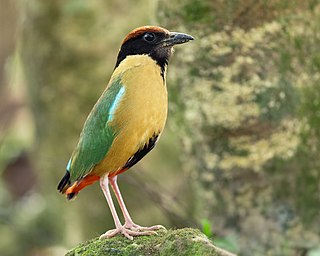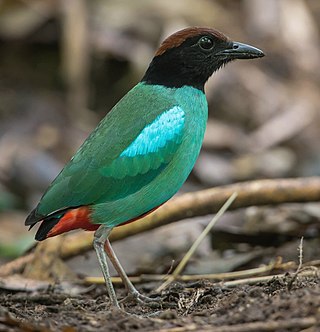
Pita or pitta is a family of yeast-leavened round flatbreads baked from wheat flour, common in the Mediterranean, Middle East, and neighboring areas. It includes the widely known version with an interior pocket, also known as Arabic bread. In the United Kingdom, Greek bread is used for pocket versions such as the Greek pita, and are used for barbecues to a souvlaki wrap. The Western name pita may sometimes be used to refer to various other types of flatbreads that have different names in their local languages, such as numerous styles of Arab khubz (bread).
Parrots are birds found mostly in tropical and subtropical regions.
Bird of paradise may refer to:

Pittas are a family, Pittidae, of passerine birds found in Asia, Australasia and Africa. There are 44 species of pittas, all similar in general appearance and habits. The pittas are Old World suboscines, and their closest relatives among other birds are in the genera Smithornis and Calyptomena. Initially placed in a single genus, as of 2009 they have been split into three genera: Pitta, Erythropitta and Hydrornis. Pittas are medium-sized by passerine standards, at 15 to 25 cm (5.9–9.8 in) in length, and stocky, with strong, longish legs and long feet. They have very short tails and stout, slightly decurved bills. Many have brightly coloured plumage.

Dosha is a central term in Ayurveda originating from Sanskrit, which can be translated as "that which can cause problems", and which refers to three categories or types of substances that are believed to be present in a person's body and mind. Beginning with twentieth-century Ayurvedic literature, the "three-dosha theory" has described how the quantities and qualities of three fundamental types of substances called wind, bile, and phlegm fluctuate in the body according to the seasons, time of day, process of digestion, and several other factors and thereby determine changing conditions of growth, aging, health, and disease.
VPK is an acronym that may refer to:

The etiquette of Indian dining and socializing varies with the region in India.

The rainbow pitta is a small passerine bird in the pitta family, Pittidae, endemic to northern Australia, most closely related to the superb pitta of Manus Island. It has a velvet black head with chestnut stripes above the eyes, olive green upper parts, black underparts, a bright red belly and an olive green tail. An Australian endemic, it lives in the monsoon forests and in some drier eucalypt forests.

Pitta is a genus of birds in the Pittidae, or pitta family. They are secretive, brightly coloured birds that forage on the forest floor. They are long-legged and short-tailed with rounded wings. They all have green on their upperparts with blue wing-patches. Many have dark heads. Nest construction, incubation and rearing of nestlings is performed by both parents. Incubation is completed in some 17 days, and the nestlings are altricial and nidicolous. Some species are migratory.
Ani is a ruined Armenian medieval city in Turkey.

The fairy pitta is a small and brightly colored species of passerine bird in the family Pittidae. Its diet mainly consists of earthworms, spiders, insects, slugs, and snails. The fairy pitta breeds in East Asia and migrates south to winter in Southeast Asia. Due to various habitat and anthropogenic disruptions, such as deforestation, wildfire, hunting, trapping, and cage-bird trade, the fairy pitta is rare and the population is declining in most places. Listed on the Convention on International Trade in Endangered Species of Wild Fauna and Flora (CITES) Appendix II, this bird is classified as vulnerable on the IUCN Red List of Threatened Species.

Vasilopita is a New Year's Day bread, cake or pie in Greece and many other areas in eastern Europe and the Balkans which contains a hidden coin or trinket which gives good luck to the receiver, like the Western European King Cake. It is associated with Saint Basil's day, January 1, in most of Greece, but in some regions, the traditions surrounding a cake or pita with a hidden coin are attached to Epiphany or to Christmas. It is made of a variety of dough, depending on regional and family tradition, including tsoureki. In some families, instead of dough, it is made from a custard base called galatopita. In the Thessaly region a pork filled phyllo pie is made with a hidden coin. The pie is also known as Chronópita, meaning "New Year's pie".

The hooded pitta is a passerine bird in the family Pittidae. It is common in eastern and southeastern Asia and maritime Southeast Asia, where it lives in several types of forests as well as on plantations and other cultivated areas. It is a green bird with a black head and chestnut crown. It forages on the ground for insects and their larvae, and also eats berries. It breeds between February and August, the pair being strongly territorial and building their nest on the ground. Incubation and care of the fledglings is done by both parents. The bird has a wide range, and the International Union for Conservation of Nature has assessed its conservation status as being of "least concern".

The mangrove pitta is a species of passerine bird in the family Pittidae native to the eastern Indian Subcontinent and western Southeast Asia. It is part of a superspecies where it is placed with the Indian pitta, the fairy pitta and the blue-winged pitta but has no recognized subspecies. A colourful bird, it has a black head with brown crown, white throat, greenish upper parts, buff underparts and reddish vent area. Its range extends from India to Malaysia and Indonesia. It is found in mangrove and nipa palm forests where it feeds on crustaceans, mollusks and insects. Its call, sometimes rendered as wieuw-wieuw, is sung from a high perch on a mangrove tree.

The blue-winged pitta is a passerine bird in the family Pittidae. It forms a superspecies with three other pittas, the Indian pitta, the fairy pitta and the mangrove pitta. A colourful bird, it has a black head with a buff stripe above the eye, a white collar, greenish upper parts, blue wings, buff underparts and a reddish vent area. Its range extends from India to Malaysia, Indonesia, southern China and the Philippines. Its habitat is moist woodland, parks and gardens and it avoids dense forest. It feeds mainly on insects and worms. It breeds in the spring, building an untidy spherical nest on the ground, often near water and between tree roots. A clutch of about five eggs is laid and incubated by both parents, hatching after about sixteen days.

Israeli pita, also known as pitot, Israeli pitta, or simply pita, is the Israeli version of pita flatbread that is commonly served with hummus and other dips, or as a sandwich bread stuffed with sabich, falafel, chicken schnitzel, shawarma, or other fillings. Israeli pita is commonly found in Israel, as well as in the United States, and at restaurants offering Jewish and Israeli cuisine worldwide.











